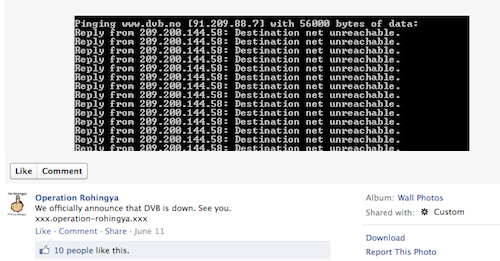Challenges of Exile Media
by Than Win Htut / July 11, 2012 / No comments
Covering the riots in Burma from abroad

Facebook group Operation Rohingya claiming responsibility for shutting down DVB's website. Photo: Screenshot of Operation Rohingya
Since riots began on the west coast of Burma in June, the main obstacles for the media have been accessing the remote towns where the riots occurred and verifying information about the conflict. For example, when a photo of the body of a rape victim appeared on social media sites, as mentioned in my last column, media organizations like DVB had to seriously consider the impact of such terrible news, its multiple dimensions, and how we could handle the story professionally.

- Though the video journalists of Democratic Voice of Burma provide daily news stories for Burma’s media, what no one gets to see is what happens behind the camera, off screen. I ask them why they do what they do and what they see as they expose a country that has been under the shadow of dictatorships for decades.

- Than Win Htut joined Democratic Voice of Burma since 2005 as a senior producer and began working as a sub-editor in tv news last year. After leaving Burma, Than lived on the Thai-Burma border and wrote for many exiled media outlets including Khit Pyaing, Amyin Thit, The Irrawaddy Magazine, and Mizzima News. He produces his own weekly science and technology TV show called “Khit Hlaine,” working with around 40 Burmese reporters living in Thailand and 40 living in Burma. He currently lives in Oslo, Norway.
We didn’t want to instigate more conflicts by covering the rape and quoting local people repeating “hearsay.” Anonymous Facebook reports also claimed that the rape and murder were organized, and that the subsequent mob attack on Muslim bus passengers and attacks on local Rakhine villages were all linked to each other. We could not verify these claims either.
Because our audience is so keen to know what’s going on, we might be mistaken in not picking up unconfirmed reports and stories on Facebook. But we strive to avoid casting any potential sparks onto the explosive social divisions. There were often heated debates in the newsroom about what we were able to confirm. Sometimes we would cover stories days after hearing about them, carefully choosing terms regarding the religion, ethnicity, and identity of those involved. Also, considering that DVB is an exile media outlet in another time zone, quickly obtaining video and photos from remote areas became one of the biggest challenges in the recent history of our newsroom.
Nationalism or professionalism? Since many of Burma’s youngsters haven’t had a chance to enjoy civil rights during the decades of military dictatorship, it’s not the goal of this column to blame them for having little awareness of the Universal Declaration of Human Rights. But the thing to consider here in terms of professionalism is that some of our young reporters seem to regard themselves as patriotic or nationalist journalists for siding against the illegal immigrants locally called “Bengali.” Most of them were sad to see their fellow citizens on the west coast suffering from communal unrest, during which their houses and villages were burned, and people were killed or injured. There was also the issue of the police and military failing to protect locals from the violence. As a result, the common way of thinking among some local reporters, and many Facebook users, is “with us or against us.” Do you stand with our ethnic Rakhine or are you against them?
This is a dangerous mentality.
Additionally, here are some of the typical comments that have been posted on all media outlets and social networks: “Show no sympathy to deaths and losses on the other side” ; “Blame the other side” ; “They should die.”
But a media organization like DVB can’t adopt a one-sided perspective. Rather, we must keep looking for voices from both sides, despite any barriers. That stance became a reason for some to attack our organization and bombard us with abusive posts and comments. DVB’s web presence was also shut down for hours following a DDOS attack against our news site and Facebook fan-pages. The attack originated in Russia where some young military officers are undergoing training.
Despite the many challenges, DVB continues to report news from the west coast of Burma.




